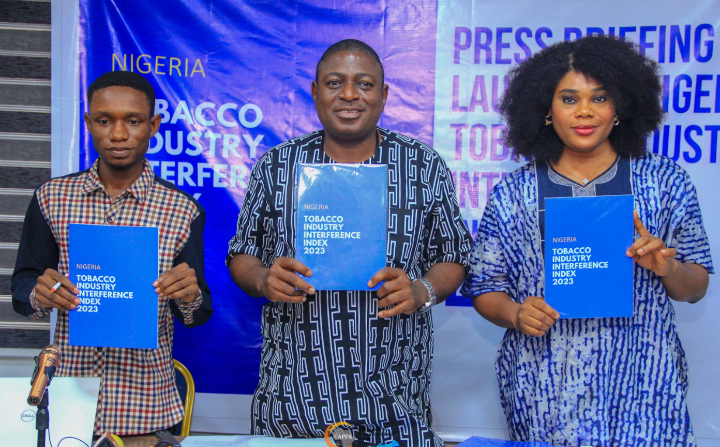
Digital Manager, Corporate Accountability and Public Participation Africa (CAPPA), Anjola Fatuase (left); Executive Director of CAPPA, Akinbode Oluwafemi and Policy and Research Officer, Zikora Ibeh at the media briefing and launch of Tobacco Industry Interference 2023 in Lagos
By Edu Abade
A new report on the state of tobacco industry interference in Nigeria has revealed a marked increase in the industry’s meddling in public health policies and in particular, tobacco control measures.
Produced by the Corporate Accountability and Public Participation Africa (CAPPA) with support from Bloomberg Philanthropies through the Centre for Good Governance, the report showed that Nigeria’s ratings among African countries and globally dropped from 53 points in 2021 to an all time low of 60 points in 2023.
The report, which was launched in Lagos on Tuesday, November 21, 2023, revealed that the main deterioration is manifest in the Nigerian government’s challenges and failure to adhere to transparency mechanisms and disclosure of exchanges with the industry as mandated by the National Tobacco Control Act (NTCA) 2015 and the National Tobacco Control Regulations 2019.
The identified breaches, the report noted, are exploited maximally by the tobacco industry to interfere in public health policies and deliberations, just as it flagged other areas of concern including:
The unnecessary and unhealthy interaction between the tobacco industry and public officials mostly in the agricultural sector, where senior government officials have participated in the industry’s activities and openly commended their initiatives and projects.
Tobacco industry’s use and celebration of Corporate Social Responsibility (CSR) activities in the media and on social platforms as a way of enhancing its image to attract unsuspecting individuals, thereby creating a perception of the industry and its products as responsible and desirable, while such CSR initiatives have been further promoted by the endorsement of state authorities, who associate and collaborate with the industry to execute socio-economic empowerment programmes.
Weak enforcement of preventive measures including ambiguities in the NTCA 2015 and its regulations of 2019, just as challenges inadvertently allow the tobacco industry to operate without accountability in certain instances.
For instance, while the NTCA mandates the tobacco industry to submit annual reports on tobacco and tobacco products, it also retains that the minister may choose to either disclose or withhold information from the public domain, maintaining that lack of transparency makes it difficult for public health advocates to verify whether compliance is being enforced or not.
Lastly, the industry’s continued participation in policy development in Nigeria such as its enjoyment of invitations from the government interagency bodies and agencies to meetings where classified resolutions on public health are reached.
To address the challenges, the report urged the Nigerian government to fully implement the National Tobacco Control Regulations 2019 and also review ambiguities in the law so they do not provide revolving doors that the tobacco industry can exploit to interfere in public health and other policies of the government.
Commenting on the report, Policy and Research Officer of CAPPA, Zikora Ibeh, said: ‘‘The Nigerian government must work to ensure that public officials in relevant ministries, departments and agencies sign conflict-of-interest forms periodically to remind them of commitments or obligations that may compromise their office and operations.”
In addition, the report urged state authorities to build intergovernmental synergy at all levels by establishing clear protocols for the full disclosures of minutes and proceedings from meetings and interactions with the tobacco industry.
It also advised relevant government Ministries, Departments and Agencies (MDAs) to consistently update their websites and other information platforms to facilitate the easy dissemination of information and engender transparency.
Researchers at CAPPA measured and evaluated incidents of tobacco industry interference in Nigeria against 20 questions based on the World Health Organisation Framework Convention on Tobacco Control’s (WHO FCTC’s) Article 5.3 guidelines. These guidelines urge member states to adopt robust measures for safeguarding their tobacco control policies from the influence of the tobacco industry.
Executive Director of CAPPA, Akinbode Oluwafemi, said: ‘‘While Nigeria’s National Tobacco Control Act and its Regulations have largely checked the activities of tobacco corporations and entities, the industry has exploited some weaknesses in these laws and gaps in the system to interfere in tobacco control.’’
The WHO FCTC came into force in 2005 and is the world’s first treaty dedicated to public health on a global scale. It was developed in response to a growing tobacco epidemic and provides a comprehensive legal framework for international cooperation in health matters.











